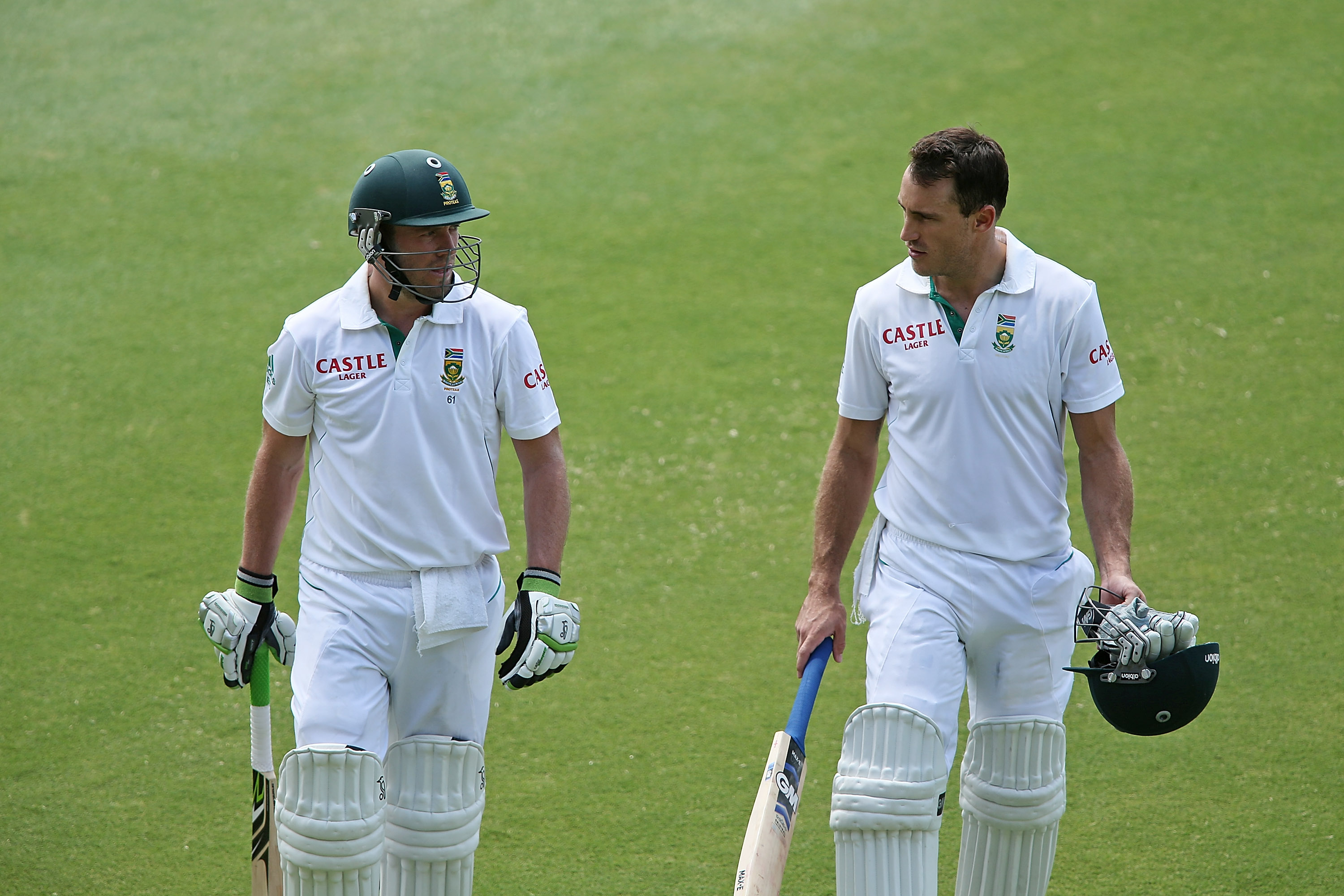Five best blockathon innings in Test cricket
Winning Test matches might be a cakewalk for many, but saving a Test match is not everyone's cup of tea. Not only does this rare art require great fitness and solid technique but needs enormous amounts of concentration and will power to overcome the odds and these batsmen exemplify those qualities.

Winning a Test match takes a little less effort when it is compared to the pain of saving a Test match. The latter may not get you many admirers, but the ordeal Test batsmen go through to save a match is what gives them their purpose as a batsman. There were the legendary Hanif
Jacques Kallis 109* vs West Indies (Guyana, 2005)

 © Getty
© GettyNever did South Africa think that they had to face an uphill task against a weak West Indies when they toured the Caribbean in April 2005. The hosts were without Brian Lara and six other regulars due to contract issues with the Windies board and Shivnarine Chanderpaul was burdened to lead the inexperienced side. But when the first Test started, it was a different story. The hosts rode on double centuries from Wavell Hinds and Chanderpaul himself to declare at a massive score of 543/5.
The Proteas batsmen looked more clueless than their bowlers as they were dismissed for 188 runs in the first innings and were forced to follow on. West Indies were by now confident of a win after seeing the back of Graeme Smith and AB de Villiers with the visitors at 68/2. All they needed to do was to get the wicket of Jacques Kallis, but that proved to be a near-impossible task. The South African all-rounder played a marathon innings of 109 not out which lasted for seven hours while facing 346 balls to bat through the entire fifth day. In the process, Kallis also became the second South African after Gary Kirsten to complete 7000 Test runs. It was more torture for the West Indian bowlers as the score moved at a snail pace of 1.5 RPO. Thanks to some unexpected help from Herschelle Gibbs, Kallis stood tall over a mind-numbing 161 overs as South Africa ended the game in a draw by losing just two wickets on the final day and scoring 269/4.
Andy Flower 232* vs India (Nagpur, 2000)
With the likes of Stuart Carlisle, Alastair Campbell, Grant Flower in their ranks, this Heath Streak-led Zimbabwean team made sure that they frustrated India to the core when they landed in the subcontinent in 2000. After India won the first Test in Delhi by 7 wickets, Sourav Ganguly chose to bat first in the second Test at Nagpur. Shiv Sunder Das and Rahul Dravid made light work of the visitors' bowling by scoring hundreds while Sachin Tendulkar scored a big double hundred for India to declare at 609/6.

 ©Getty
©GettyIn reply to this huge total, Zimbabwe were all out for 382 runs in their first innings after the eldest of the Flower brothers, Grant scored a superb century. With Zaheer Khan and Javagal Srinath in good form, another easy victory for India looked imminent. But little did they know that the minnows would put up a fightback of such epic proportions. After joining Alistair Campbell at the crease with the score at 61/3 on the fourth day of the match, Andy Flower batted through five whole sessions of the Test match to become the fourth Zimbabwean to score a Test double-century. Sourav Ganguly tried a total of 11 bowlers to get the wicket of Andy Flower including himself, Rahul Dravid, Sachin Tendulkar and Shiv Sunder Das but to no avail. The wicketkeeper-batsman remained unmoved and unbeaten as he scored 30 fours and two sixes on his way to a score of 232 earning Zimbabwe a draw by ending the final day at 503/6.
Ricky Ponting 156 (The Ashes, 2005)
The 2005 Ashes will remain in the hearts of the fans for bringing back the banter, intensity, and fun to the century-old rivalry between Australia and England. While Australia lost the Urn to England by losing 2-1, Ricky Ponting's epic 156 to save the third Test at Old Trafford exemplified his character as a fighting leader. After winning the first Test at Lord's and
England wasted no time by scoring 280 in the second innings and set the Aussies a target of 423 runs. With as many as 70 overs left in the final day's play, Australia lost opener Justin Langer cheaply at 25 and the English pacers made sure that the wickets kept falling at regular intervals. While things were crumbling around him, captain Ricky Ponting ground it out with his resolute defence at the crease. Spending 411 minutes in the middle, Ponting endured torrid spells from Steve Harmison, Matthew Hoggard, and an in-form Andrew Flintoff to register a fighting century. As Australia slowly edged towards the end and with five more overs left in the day, Steve Harmison's bouncer took a glance off Ponting's glove to be caught by keeper Geraint Jones. With the score reading 354/9, the skipper's face bore an expression of huge disappointment as all his hard work on the day seemed to go in vain. But Brett Lee and Glenn McGrath saw out the remaining overs to ensure his work was not undone.
Faf du Plessis 110 vs Australia (Adelaide, 2012)
Debuts hardly come at such difficult situations and to overcome those odds in your first match to guide your team to safety requires a special amount of maturity. Thanks to great defending by the South African batsman and a splendid bowling effort from Peter Siddle, the Adelaide Oval entertained the audience with a nail-biting draw. After managing to draw the first Test at Brisbane, South Africa

 © Getty
© GettyThe Proteas lost JP Duminy to an injury before the Test match and handed a Test debut to Faf du Plessis. David Warner and Mike Hussey scored centuries apiece as skipper Michael Clarke scored 230 to take Australia to 550 in their first innings. Thanks to a gritty half-century by the ever-dependable Jacques Kallis, who was also suffering from a hamstring strain, the visitors posted 388 in reply. But their true danger came when Australia set them a target of 430 runs with almost one and half day of play left. And with Peter Siddle running in hard to unleash fire, the visitors were facing the end of the barrel at 45/4.

 © Getty
© GettyThis did not scare debutant du Plessis a bit as he quickly settled down with AB de Villiers in the middle. The pair batted through the entire morning session of the final day adding 49 runs in 35 overs. Despite de Villiers departing after a superb innings of 33 after playing 220 balls, du Plessis went back to his match-saving mode alongside Kallis. He reached his century in 310 deliveries but the debutant's focus remained the same. After Kallis departed for a 149-ball 46 with the score at 233/6, Siddle removed Dale Steyn and Rory Kleinveldt to bring Australia closer to the victory. But du Plessis matched the pacer's effort by combining with Albie Morkel to play out a draw ending the day at 248/8.
Micheal Atherton 185* not out vs South Africa (Johannesburg, 1995)
After rain played spoilsport in the first Test at Centurion, England seemed destined to lose the second match at Johannesburg had it not been for captain Mike Atherton's batting masterclass. The English skipper wrote his name into history books with a marathon innings that lasted ten hours and 43 minutes. That's right, nearly eleven hours of batting!

 © Getty
© GettyThe hosts put up a good total of 332 in the first innings and with likes of Allan Donald, Brian McMillan and Shaun Pollock in full flow, England were reduced to 200 runs in their first innings on the second day itself. The Proteas then scored 346 runs in their second innings and invited England to bat for a target of 479 runs. With almost two full days of play left, Atherton and Alec Stewart gave the visitors a steady start of 75 runs for the first wicket. But South Africa kept coming at the English batsmen as three more wickets fell by the end of the fourth day.
Atherton took guard on the final day with just one aim in his mind—to save the Test match. After being given a life by Gary Kirsten when he was dropped on 99, Atherton combined with Robin Smith to

Comments
Sign up or log in to your account to leave comments and reactions
0 Comments